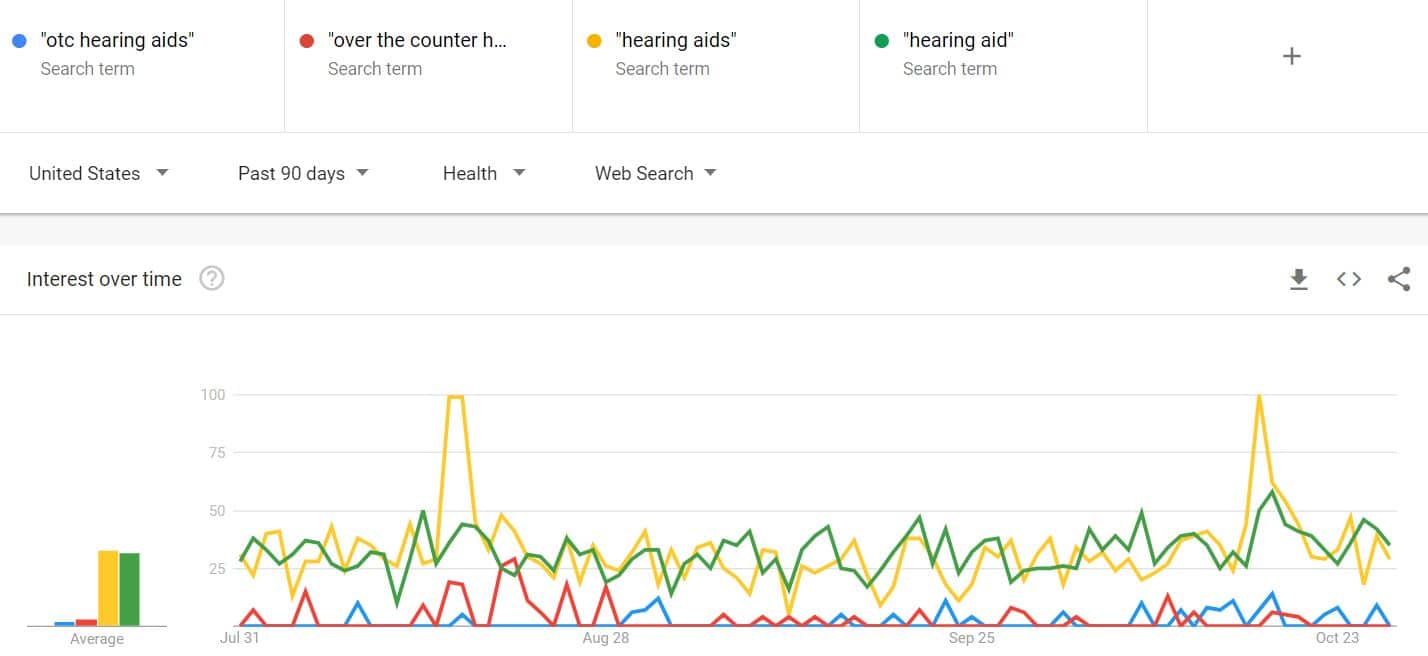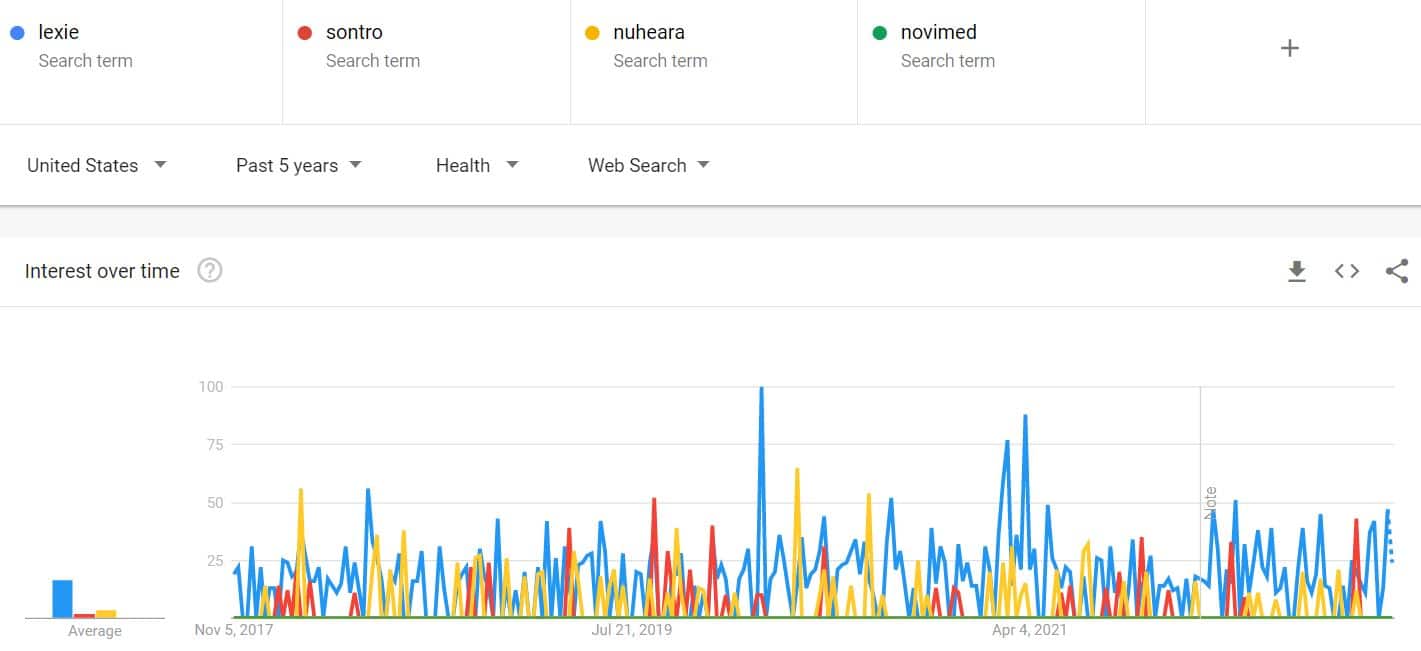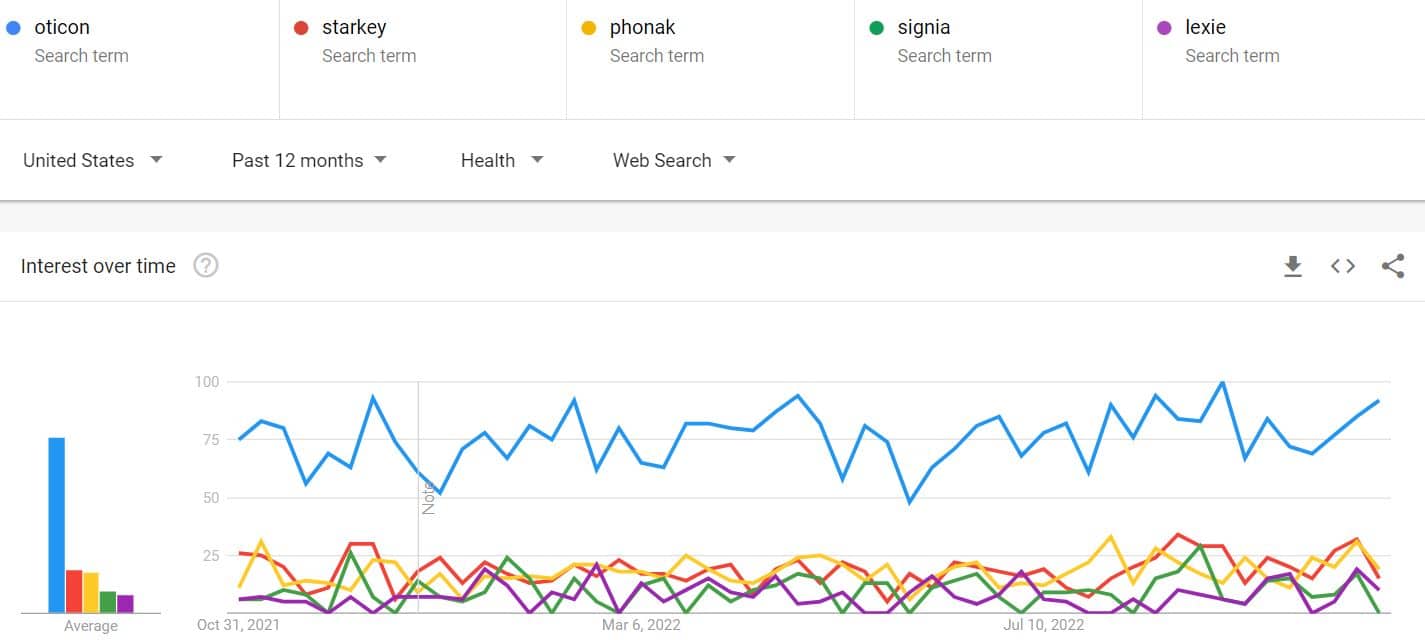Google Trends is a Google tool used to analyze search traffic trends for different searched keywords and phrases. The figures are representative of interest in a searched keyword or phrase over time and provides comparisons illustrating the popularity of different search terms in relation to one another. We wanted to see if these trends could illuminate the relationship between hearing aid and OTC device popularity online.
How Are Hearing Aids and OTC Devices Trending in Search?
We chose to compare the terms ‘otc hearing aids’ and ‘over the counter hearing aids’ because ‘otc hearing devices’ and ‘otc hearing instruments’ did not have enough data to display in Google Trends. That indicates a low trend volume and that internet users are predominantly putting ‘otc’ before ‘hearing aids’ when searching for them.

Over the last three months, trends have remained fairly steady for OTC and hearing aid search terms. Interest did experience a spike on August 16th and October 17th. August 16th was the day the FDA announced final approval for over-the-counter hearing aid sales in the United States. October 17th was the day OTC sales began. In both instances, search trends returned to their previous pre-announcement levels in the days that followed.
Hearing aid searches are still trending vastly higher than OTC terms at this point in time.
Are OTC Manufacturers Trending in Search?
Outside of some major spikes that likely align with news coverage or major releases, OTC search trends have remained steady over the last five years. Lexie was the largest trending OTC hearing device manufacturer by a factor of at least five.

Because other manufacturers are all trending below them, Lexie is an ideal baseline when we compare OTC manufacturer and hearing aid manufacturer trends.
Are OTC Searches Out-Trending Hearing Aid Searches?
The short answer is no. Over the past twelve months, Oticon and Phonak have trended slightly upward, while Starkey, Signia and Lexie have trended at a relatively even rate throughout the year. Even as the top representative of OTC hearing devices, Lexie is still trending below hearing aid manufacturers.

What Approach Does the Data Support?
Right now, the data supports a cautious one. Google often takes some time to properly understand new search terms and what it should show visitors, especially when those terms are part of an entirely new product line, as OTC products are.
We don’t know how Google will choose to display results when someone searches for ‘OTC hearing aids,’ and Google identifies a local interest. Any current searches are going to show results that will not remain relevant once big box stores begin to carry OTC products and compete against one another.
When Do You Deliver a Message on OTC and What Should It Say?
The largest pool of visitors to your website who are close enough to become a patient, are the patients you already have. What would you tell a patient about OTC products and when would you tell them?
If you haven’t instructed your office manager to hand deliver a pamphlet on OTC while wearing a shirt that says, “Have you heard of over-the-counter hearing aids?” then you probably don’t want to put OTC messaging on your homepage.
Ranking for these products once they are available online from big box stores is not a possibility. As a non-national practice, you will not be able to outrank Best Buy, Walmart and Walgreens.
The biggest question is, “Am I selling or fitting OTC products?”
If the answer is no, then your messaging needs to resonate with people who have not heard of OTC products, had a bad experience with OTC products or are looking for guidance while navigating OTC products.
You know when OTC products are an option. Your patients do not.
That’s what they need help understanding, and that’s much easier to accomplish in person. What your patient needs should determine your approach.
If they haven’t heard of it, why are you prescribing a hearing aid and why will any device with a lower level of technology fail your patient?
If they have had a bad experience with it, how can you re-ignite their excitement and drive to treat their hearing loss?
If they’re looking for guidance, what do you think someone should know before choosing an OTC product or a hearing aid? What are the critical steps that will help them make an informed decision?
The answers you provide help build a relationship between you and your patients. Your website is a tool that can help patients find you, learn about you, and ultimately, reach you. But it has its limitations. It can’t shake their hand, it can’t express concern or attentiveness and it can’t ask the important follow-up questions that establish a dialogue between you and your patient.
What Should I Put On My Website?
An FAQ is the perfect way to add to your website’s informational knowledge base while including OTC-related questions on a page where OTC is not the focus. The FAQ should answer answer the following questions:
- What is an over-the-counter (OTC) hearing aid?
- What is the difference between a hearing aid and an OTC hearing aid?
- What kinds of hearing loss is an OTC hearing designed for?
- Can I get a hearing aid without an audiologist?
This provides the opportunity to start a dialogue with curious website visitors who are searching for answers, and including these OTC-related questions as just one part of a generalized FAQ keeps the focus on audiology.
What Else Can You Do?
Prepare your team. Questions don’t always start with the audiologist. What is the messaging from any ENTs you work with? Have you spoken to your front-office staff about how to answer questions regarding OTC products or patients who may allude to them?
These are the interactions that are going to allow you to position yourself as the expert that you are. You know OTC products are only going to be useful for a limited subset of people with hearing loss. You know how much satisfaction depends on a proper fitting, setup and follow-up—something OTC products do not provide. You know the dangers of misusing an OTC product by overcorrecting for a lower level of hearing loss. Your team should know when and how to effectively deliver this message because OTC manufacturers won’t be able to.
Fuel Medical Group’s employee development team can help. Contact us today!


